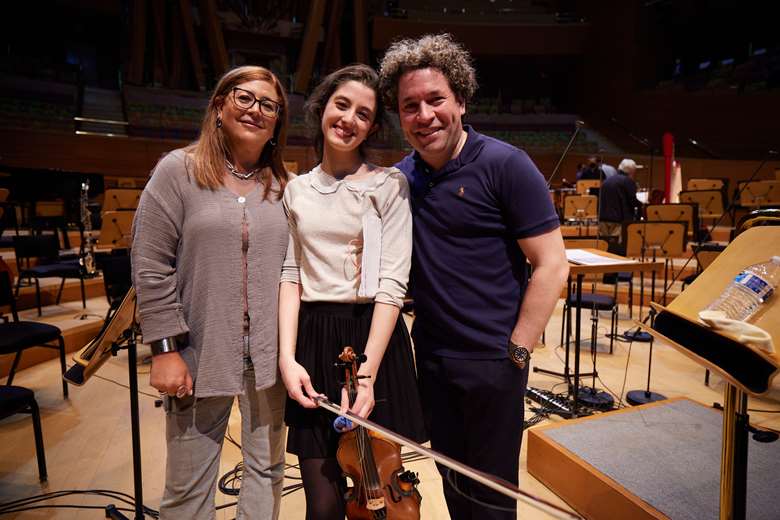Q&A with composer, Gabriela Ortiz
Theo Elwell
Monday, June 10, 2024
We spoke to the composer about her latest album, 'Revolución Diamantina' and her collaborations with Gustavo Dudamel

Photo credit: Danny Clinch
Q. You have collaborated with conductor, Gustavo Dudamel for this record. What has it been like to work with him and the LA Philharmonic?
I met Gustavo in 2017 when he conducted my work for orchestra called Teenek. I was very impressed by his intelligent and immediate understanding of my music, it was as if we had worked together for several years. It is true that Gustavo and I share a cultural identity being Venezuelan and I Mexican, but I think our understanding goes far beyond this. The pieces on this album were commissioned by him and the Los Angeles Philharmonic and represent the result of a collaboration of many years. I think it has been a great learning experience for both of us and I am deeply grateful for his trust in me and for always allowing me to be myself through my music.
Q. Your ballet, Revolución Diamantina,is based on the ‘Glitter Revolution’, the uprising provoked by violence against women in Mexico. How was the research and development process of composing this work different from others? Did you use any personal accounts to help tell the story?
The title of the ballet refers to the demonstration that took place in Mexico in 2019 where a police man raped a young girl and the women of Mexico City took to the streets in protest. They threw diamantina rosa (pink glitter powder) all over as if it was a weapon of peace.
This ballet represents an unprecedented point in my musical production. For the first time I decided to highlight a deeply complex and painful subject: the different forms of violence against women that in many cases end in femicide. For this I had the opportunity to collaborate with the writer Rivera Garza, recently awarded with the Pulitzer Prize. She proposed a poetic way to structure the ballet, precisely addressing these different forms of violence.
The ballet is divided into acts that incorporate varied scenarios related to feminism: harassment and a lack of security in public spaces; the confusion between the language of romantic love and practices of manipulation and control that all too often can lead to lethal forms of violence against women; solitude and a lack of sense of belonging; the voices of the disappeared; the blind march that makes its appearance on the horizon of a nonsensical place; the intimate terrorism that occurs between couples, as well as its stages and consequences; street protests and cries for justice; and finally, the aspiration that only by walking together will we be able to find a way out. Because the cause of these experiences is all of us: women, men, people.

Q. Your violin concerto Altar de cuerda also features on the album. What was the compositional process like? Did you collaborate with your violinist, Maria Dueñas during the process?
Yes, from the beginning I knew that I would write this concerto for the talented young violinist María Dueñas. Once I had the conceptual idea of the concerto, influenced by my previous flute concerto dedicated to Alejandro Escuer, I started working on the main violin part. As soon as I had the material I immediately sent it to María and there we began an exchange of ideas and proposals that led me to her final version. I was very impressed that in the first rehearsal Maria had not only solved the technical part but had also understood her aesthetics in a very deep way. Maria is a type of interpreter that takes the music to unexpected places with a maturity and musicality that is out of this world.
Q. Do you have any plans to bring this repertoire to stages in the UK?
Last weekend we premiered Altar de Cuerda with the LA Phil and Dudamel at the Barbican. My dream now is to bring to the stage my ballet Revolución Diamantina, with a ballet company and an original choreography concept… Let’s see!
Q. Finally, what are you listening to at the moment?
I’ve just finished composing a concerto for cello and orchestra dedicated to Alisa Weilerstein, so I've been listening to an enormous breadth of music from all genres and periods for this beautiful instrument.







